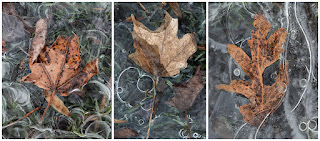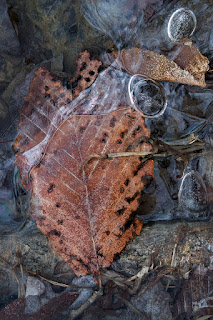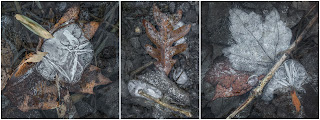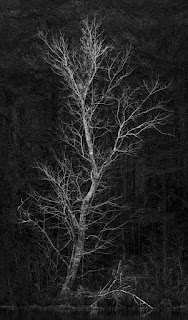"The creative process,
like a spiritual journey,
is intuitive, non-linear,
and experiential.
It points us toward
our essential nature,
which is a reflection of
the boundless creativity
of the universe.
...
To be still means to
empty yourself from the
incessant flow of thoughts
and create a state of
consciousness that is
open and receptive."
- John Daido Loori (1931 - 2009)
Postscript. My postscript to a blog entry I published a few days ago ("
...Another Order") included an "apology" from me for the poor quality of the image I posted, which I made with an iPhone on a morning walk. I also said that I was looking forward to going out with my "real camera" on the weekend to hunt for "ice abstracts" (cold weather permitting). Well, today was the day. Our local forecast had overnight lows in the low 20s (F). So our younger son (
Josh, the photographer), my wife and I all eagerly woke up early, warmed ourselves with a bit of coffee and breakfast, and drove to a nearby lake park. As Josh and I both bolted out the van with our cameras and ran to the water, our smiles immediately vanished.
No ice! Or at least none of the symphony of abstract swirls and curlicues we both anticipated spending the morning reveling and composing in. Naturally, we were crestfallen, and had a depressed notion to traipse back home and crawl back into our beds. Luckily, my wife, who joined us more for the adventure and some exercise, is also our Zen master.
"Just enjoy what's here," she said, "
Have a bit of fun!" So we did; and, my oh my, what fun we all had 😊 I am embarrassed to admit that, though I've experienced this exact scenario countless times (
here is one from almost 15 years ago), the basic lesson has apparently never stuck:
there are always unexpected opportunities and joys waiting for us, if only (as John Daido Loori reminds us) we are open and receptive to the boundless creativity of the universe. There may have been no real ice, but after slowing down and emptying ourselves of our "incessant flow of thoughts," Josh and I discovered a veritable paradise of tiny "icelet universes," some free-standing, others entwined with small leaves, rocks, and twigs. Though these icelets were few in number, and some were so small that only Josh (who presciently attached a macro lens to his camera before leaving the house) was able to find workable compositions, we all felt like privileged visitors to a magnificent living museum of fleeting wonders. And so, bowing to my Zen master's sage wisdom, an early morning "disappointment" was quietly transformed into a stunningly joyous experience filled with the simplest pleasures of life: family, nature, and a total "loss of self" in the creative process.
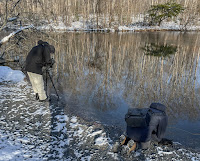
Josh and me "merrily composing whatever morsels of icelets we could find" (captured by my wife).










